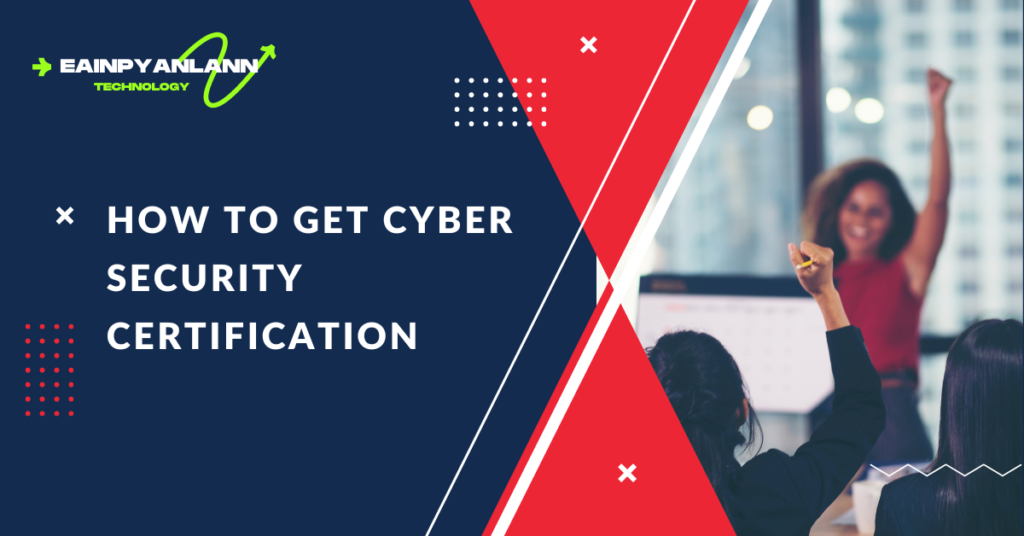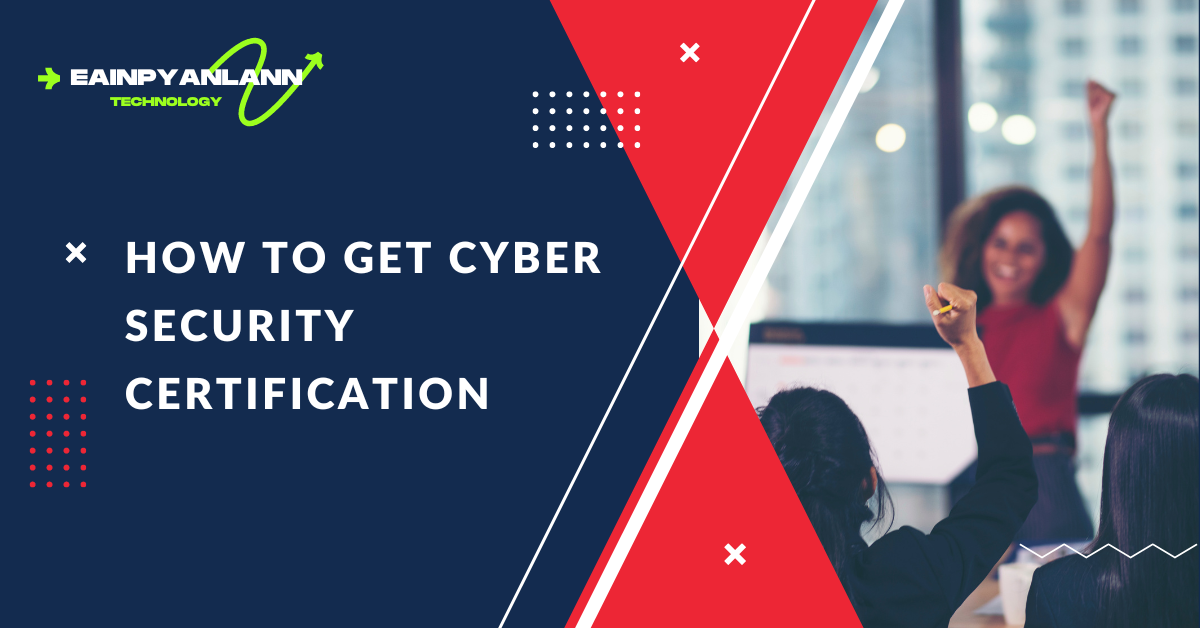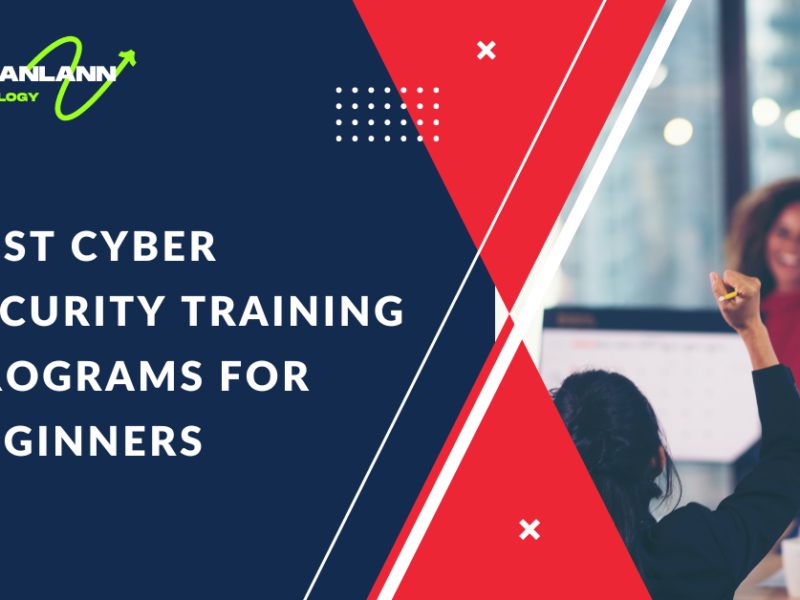In today’s digital age, cybersecurity has become a critical concern for organizations and individuals alike. With the rising number of cyber threats, professionals in the field of cybersecurity are in high demand. One of the most effective ways to demonstrate your expertise and stand out in the job market is by obtaining a cybersecurity certification. This comprehensive guide will walk you through everything you need to know about getting a cybersecurity certification, from understanding the different types of certifications available to the steps required to earn them.

Cybersecurity is a rapidly evolving field, and staying ahead of cyber threats requires a combination of technical skills, practical experience, and formal education. Cybersecurity certifications are designed to validate your skills and knowledge, providing a benchmark for your expertise in various aspects of cybersecurity. Whether you are just starting your career or looking to advance to a higher level, obtaining a certification can be a valuable asset.
Why Cyber Security Certification Matters
Cybersecurity certifications offer several benefits, including:
- Validation of Skills: Certifications provide tangible proof of your skills and knowledge, which can be crucial for job applications and promotions.
- Career Advancement: Certifications can open doors to new job opportunities, higher salaries, and increased job security.
- Industry Recognition: Many certifications are widely recognized and respected within the cybersecurity community, enhancing your professional reputation.
- Up-to-Date Knowledge: Certification programs often include the latest industry trends and best practices, ensuring that your knowledge remains current.
Types of Cyber Security Certifications
There are various cybersecurity certifications available, catering to different levels of expertise and specialization. Here, we categorize them into three main levels:
Entry-Level Certifications
These certifications are ideal for individuals who are new to the field of cybersecurity. They provide foundational knowledge and skills necessary to start a career in cybersecurity.
- CompTIA Security+
- Overview: This certification covers basic security concepts, network security, compliance, and operational security.
- Prerequisites: None
- Exam Details: The exam consists of multiple-choice questions and performance-based questions.
- Certified Cybersecurity Entry-level Technician (CCET)
- Overview: This certification focuses on fundamental cybersecurity skills and knowledge required for entry-level positions.
- Prerequisites: None
- Exam Details: The exam tests foundational cybersecurity concepts and problem-solving skills.
Intermediate-Level Certifications
These certifications are designed for professionals with some experience in cybersecurity who are looking to deepen their knowledge and take on more advanced roles.
- Certified Information Systems Security Professional (CISSP)
- Overview: The CISSP certification covers a broad range of cybersecurity topics, including security and risk management, asset security, and network security.
- Prerequisites: At least five years of work experience in the field of information security.
- Exam Details: The exam consists of multiple-choice questions and advanced questions based on real-world scenarios.
- Certified Ethical Hacker (CEH)
- Overview: This certification focuses on ethical hacking techniques, including penetration testing and vulnerability assessment.
- Prerequisites: Two years of work experience in the information security domain or completion of an EC-Council training program.
- Exam Details: The exam includes multiple-choice questions based on ethical hacking principles and techniques.
Advanced-Level Certifications
These certifications are intended for experienced cybersecurity professionals who want to specialize in a particular area or advance to leadership roles.
- Certified Information Security Manager (CISM)
- Overview: The CISM certification is geared towards individuals in managerial roles, focusing on information risk management, governance, and incident management.
- Prerequisites: At least five years of work experience in information security management.
- Exam Details: The exam covers four domains: information security governance, risk management, information security program development, and incident management.
- Certified Information Systems Auditor (CISA)
- Overview: This certification is designed for professionals involved in auditing, control, and assurance of information systems.
- Prerequisites: At least five years of work experience in information systems auditing, control, or security.
- Exam Details: The exam consists of multiple-choice questions covering various aspects of information systems auditing.
Choosing the Right Certification
Selecting the right certification depends on several factors, including your career goals, current experience level, and areas of interest. Here are some considerations to help you choose:
- Career Goals: Determine which certification aligns with your long-term career goals. For example, if you aspire to work in a managerial role, consider certifications like CISM or CISA.
- Current Experience: Choose a certification that matches your current level of experience. Entry-level certifications are ideal for beginners, while advanced certifications are suited for experienced professionals.
- Specialization: Consider any areas of specialization you are interested in, such as ethical hacking, risk management, or network security.
Preparation Strategies
Preparing for a cybersecurity certification exam requires a strategic approach. Here are some effective preparation strategies:
Study Materials
- Official Study Guides: Use study guides provided by the certification body or other reputable sources. These guides are specifically tailored to the exam content.
- Books and Online Resources: Explore books, online courses, and tutorials related to the certification. Websites like Coursera, Udemy, and LinkedIn Learning offer valuable resources.
- Practice Exams: Take practice exams to familiarize yourself with the exam format and identify areas where you need improvement.
Practice Exams
- Mock Tests: Regularly take mock tests to assess your readiness for the actual exam. Mock tests help you understand the types of questions you may encounter and improve your time management skills.
- Simulated Environments: Some certifications offer simulated exam environments to help you practice under realistic conditions.
Study Groups
- Join Study Groups: Participate in study groups or online forums where you can discuss exam topics, share resources, and get support from peers.
- Attend Workshops: Attend workshops or webinars organized by certification bodies or industry experts to gain additional insights and knowledge.
The Certification Exam
Understanding the exam format and being well-prepared can significantly impact your performance. Here’s what you need to know:
Exam Format
- Question Types: Exams may include multiple-choice questions, performance-based questions, or scenario-based questions. Familiarize yourself with the question types and formats.
- Duration: Be aware of the exam duration and the number of questions. Manage your time effectively during the exam to ensure you complete all questions.
Tips for Success
- Study Regularly: Create a study schedule and stick to it. Regular study sessions are more effective than cramming.
- Practice Time Management: Practice answering questions within the allotted time to improve your speed and efficiency.
- Stay Calm: Stay calm and focused during the exam. Take deep breaths and manage stress to perform at your best.
Maintaining Your Certification
Cybersecurity certifications often require ongoing maintenance to ensure that your skills and knowledge remain current. Here’s how to maintain your certification:
- Continuing Education: Many certifications require you to complete continuing education units (CEUs) or professional development activities.
- Renewal Fees: Pay any renewal fees associated with your certification to keep it active.
- Stay Updated: Keep up with industry trends and changes to ensure your knowledge remains relevant.
Career Benefits of Cyber Security Certifications
Obtaining a cybersecurity certification can have a significant impact on your career. Here are some benefits:
- Increased Job Opportunities: Certifications can open doors to new job opportunities and career advancement.
- Higher Salaries: Certified professionals often command higher salaries compared to their non-certified counterparts.
- Professional Credibility: Certifications enhance your professional credibility and demonstrate your commitment to the field of cybersecurity.
- Networking Opportunities: Engage with a community of certified professionals through forums, conferences, and professional organizations.
Conclusion
Cybersecurity certifications are a valuable investment in your career, providing validation of your skills and knowledge while opening doors to new opportunities. By understanding the types of certifications available, choosing the right one for your career goals, and employing effective preparation strategies, you can successfully earn a certification and advance in the field of cybersecurity. With the growing demand for cybersecurity professionals, obtaining a certification can be a key step toward achieving career success and making a meaningful impact in the digital world.



Thanks
Hello